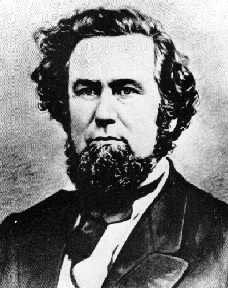- Francis Harrison Pierpont
Infobox Politician
name = Francis Harrison Pierpont
width = 200px
height = 200px
caption = Portrait of Francis Pierpont
birth_date = birth date|1814|1|25|mf=y
birth_place = Morgantown (then in Virginia)
residence =
death_date = death date and age|1899|3|24|1814|1|25|mf=y
death_place =Pittsburgh, PA
office =Governor of Virginia
salary =
term_start = 1865
term_end = 1868
predecessor =William "Extra Billy" Smith
successor =Henry H. Wells
constituency =
party = Republican
religion = Methodist
occupation = Lawyer
majority =
spouse = Julia Augusta Robertson
children =
website =
footnotes =Francis Harrison Pierpont (
January 25 1814 ndashMarch 24 1899 ), called the "Father ofWest Virginia ", was an American lawyer, politician, and governor of the union controlled parts ofVirginia during the Civil War. After the war, he was the Governor of all of Virginia. In recognition of his significance to their state history, in 1910 the state of West Virginia donated a marble statue of Pierpont as their second contribution to theU.S. Capitol 'sNational Statuary Hall Collection .Early life
Born near Morgantown (and kin to its founder
Zackquill Morgan ), Pierpont grew up in western Virginia, in what is todayMarion County, West Virginia and was linked with the region's history for the rest of his life.cite web |url=http://www.wvhumanities.org/Statehood/pierpont.htm|title=Francis Harrison Pierpont|accessdate=2007-03-08|publisher=West Virginia Encyclopedia] He graduated fromAllegheny College , and taught school in Virginia and Mississippi while also studying law. He was admitted to the bar in 1841, and became the local attorney for theBaltimore and Ohio Railroad in 1848. Prior to entering politics, he also helped found Fairmont Male and Female Seminary, the forerunner toFairmont State University .Political career
Civil war
An active supporter of
Abraham Lincoln , Pierpont became more involved in politics as an outspoken opponent of Virginia'ssecession from the Union. When Virginia seceded and entered the war, delegates from the northern and northwestern counties of Virginia, who refused to join the Confederacy, met at theWheeling Convention . These counties ultimately declared that their elected officials had abandoned their posts and established a separate government in Wheeling, with Pierpont as the provisional governor. This "Restored government of Virginia " drafted a new Virginia Constitution and sent representatives to the Union Congress.cite web |url=http://www.aoc.gov/cc/art/nsh/pierpont.cfm |title=Francis Harrison Pierpont |accessdate=2007-03-08 |publisher=U.S. Architect of the Capitol] In 1862, he attended the LoyalWar Governors' Conference inAltoona, Pennsylvania , organized by Pennsylvania GovernorAndrew Gregg Curtin , which ultimately backedAbraham Lincoln 'sEmancipation Proclamation and the Union war effort.Under Pierpont's leadership, the Wheeling government called for a popular vote on the question of the creation of a new separate state. Popular approval was overwhelming, and an application was subsequently made to Congress, who also approved the issue. [cite web |url=http://www.wvculture.org/history/statehoo.html |title=West Virginia Statehood |accessdate=2007-03-08 |publisher=West Virginia Division of Culture and History] The new state took the name West Virginia and was admitted into the Union in 1863. When
Arthur I. Boreman was elected governor for West Virginia, Pierpont became governor of the "restored" state of Virginia, comprising the several Northern Virginia counties occupied by Union troops. The capital of the restored state was established in Alexandria for the remainder of the Civil War. At the end of the war in 1865, PresidentAndrew Johnson appointed Pierpont as the provisional governor of the reunited state of Virginia, and the capital was moved back toRichmond, Virginia . cite book |last=Morgan |first=Lynda |title=Emancipation in Virginia's Tobacco Belt, 1850-1870 |publisher=University of Georgia Press |date=1992 |id=ISBN 0-8203-1415-3]Reconstruction
As the South became increasingly resistant to Reconstruction after the war, the United States Congress passed the Military
Reconstruction Act of 1867. Through this Act, Virginia became the "First Military District " in 1868, and Pierpont was replaced by military governorJohn Schofield , who governed until a new constitution could be enacted. Pierpont became one of the key figures in the Virginia constitutional convention of 1867-1868, which resulted in the "Underwood Constitution" of 1870. After this, Pierpont left Virginia politics and returned to his law practice in West Virginia.Pierpont subsequently served one term in the West Virginia legislature in 1870, but lost his seat when the Democrats took control of the state. His last public office was as collector of Internal Revenue under President
James Garfield . After his retirement, he helped create the West Virginia Historical Society before dying inPittsburgh, Pennsylvania on March 24, 1899. Three years later his remains were relocated and he rests today at Woodlawn Cemetery in Fairmont, West Virginia, beside his wife Julia and three of his four childrenReferences
Wikimedia Foundation. 2010.
